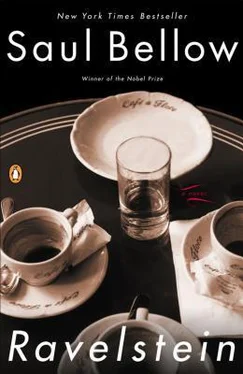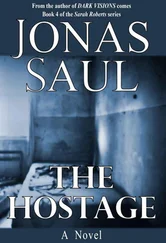Rosamund kept herself in good shape. She meditated, she at tended yoga classes. She could touch her temple with her toe. But she had overstrained herself with the luggage from Saint Martin. She managed somehow to drag it up the stairs to the apartment on the third floor. You'd never have thought that she had the muscle for it.
It was easier to do this, she said, than to get help from the hospital. None of her calls were answered. On holidays, when the doctors are off, the residents are supposed to cover for them. "Well, it isn't as urgent as you think," I said. "You can talk to the doctors tomorrow." But it was clear to Rosamund that I didn't know what I was saying. If I had stayed on in Saint Martin I should have died before morning. If I had missed the connecting flight from Puerto Rico I would have died in San Juan. And if I had had my way about a good night's sleep in my own bed I'd have been a goner. Rosamund said that without oxygen I couldn't have survived the night.
As the sun went down, the crows were sounding their klaxons. Here they have become city birds. Some French poet had called them _les corbeaux delicieux__-but who? I doubt that even Ravelstein would have known. My mind could no longer follow itself. But I was certain that my pillows and quilt would save me.
But Rosamund had reached her father in upstate New York by phone. "Think who is the most influential person you can reach," he told her. "Ask for his help."
In my address book Rosamund luckily found the home number of Dr. Starling, the man who had brought us to Boston. When she told him what was happening, he said, "Within ten minutes you will hear from Andras, the hospital director. Keep your line clear." Very soon Dr. Andras, a very old man, was questioning Rosamund about my symptoms; then he said he was sending an ambulance to bring me in. Rosamund told him that in the Caribbean I had re fused to get into the ambulance. The old director asked if he could talk to me about this? Well, yes, I told him I was comfortable where I was, in my own bed, but to please my wife I would agree to be examined by the doctors. But I wouldn't be carried out on a stretcher. Foolishly negotiating, I agreed to be a passenger.
"Done!" said Dr. Andras. "We need you here right away."
So sitting next to the driver I was taken by the ambulance with lights twirling and throaty siren sobs to the emergency room. There I was wheeled on a gurney into a corner where I was examined by several doctors. I have no coherent knowledge of what followed. I mainly remember that I was immediately put on oxygen. This was followed by an extended delay. Some said I should go immediately to cardiac intensive care. Others thought that breathing was the problem. The nurse put an oxygen mask over my face, which I kept pushing away. Rosamund was there to look after me. She said, "You've got to have the oxygen, Chick, and I don't want them to tie your hands."
"But I'm suffocating," I said.
I have my own version of what was happening. There was a doc tor in charge who did not wear a white coat but was in shirt sleeves. Talkative and technical, he had a high color and in a casual manner he described my condition. In such circumstances men and women arise, appear, they materialize. This talkative doctor seemed to be talking about technicalities which had no bearing on my condition. But I misunderstood entirely what was happening. I was sent to cardiac intensive care and there, that same night, I had a heart failure. But I have no memory of this. Nor of the pulmonary intensive care unit to which I was moved. Rosamund tells me that both my lungs were, to use the clinical term, whited out by pneumonia. A machine did my breathing for me-tubes down my throat, up my nose.
I didn't know where I was, nor was I aware that Rosamund slept beside me in a reclining chair. She often spent her nights among the relatives camping in intensive care during the crises of sons or sisters. During the first ten days Rosamund didn't go home. She ate the scraps of food she found on trays. She refused to go to the cafeteria lest I should die while she was eating. When the nurses under stood this they began to feed her.
All this I learned later. I was certainly not aware that I was fighting for life. During these weeks I was heavily dosed with Verset. One effect of this drug is to suspend all mental life. I didn't consider whether I was dead or alive. All appearances (the external world) were canceled. My late brothers, both of them, drew near, once. They wore their customary shirts, neckties, shoes, the suits their tailors made for them. My father was in the background. He didn't come forward. My brothers indicated that they were satisfied with their condition. I didn't call out to my father. He knew what the rules were. I didn't see the point in asking questions. Feeling myself more than halfway there, I was not urgently curious. I wanted in formation, but the answers could wait. Then my brothers with drew, or were withdrawn. I did not think of myself as a dying man. My head was full of delusions, hallucinations, cockeyed causes and effects. Verset is said to deaden the memory. But my memory has always been tenacious. I can remember being turned often. Some nurse or orderly who knew what he was doing pounded me on the back and ordered me to cough.
I had visited Ravelstein and other friends and relatives in the intensive care units of various hospitals and with the natural stupidity of a sound, healthy man had sometimes considered that I might one day be the person strapped down, plugged into the life-supporting machines.
But I was now the dying man. My lungs had failed. A machine did my breathing for me. Unconscious, I had no more idea of death than the dead have. But my head (I assume that it was the head) was full of visions, delusions, hallucinations. These were not dreams or nightmares. Nightmares have an escape hatch…
Mostly I recall that I was wandering about, having a heavy time of it. In one of my visions I am on a city street looking for the place where I am supposed to pass the night. At last I find it. I enter what was long ago, in the twenties, a movie palace. The ticket booth is boarded up. But just behind it, on a tile floor that slopes upward are folding army cots. There is no film being shown. The hundreds of seats are empty. But I understand that the air in here is specially treated and that it will be good for your lungs to breathe it in. You get medical points toward your recovery for spending the night here. So I join half a dozen others and lie down. My wife is supposed to pick me up in the morning. The car is in a parking lot nearby. Nobody here is sleepy. Nor are the men talkative. They get up. They mooch about the lobby or sit on the edge of a cot. The floor hasn't been mopped in fifty years or more. There is no heat. You sleep fully dressed in your buttoned overcoat. Hats, caps, and shoes are not removed.
Even before my release from the intensive care unit, I climbed out of bed thinking that I was in New Hampshire and that one of my granddaughters was skiing around the house. I was annoyed with her parents for not having brought her in to see her grandfather. It was a winter morning, or so I thought. Actually, it must have been the middle of the night, but the sun seemed to be shining on the snow. I climbed over the bedrail without noticing that I was attached by tubes and needles to hanging flasks containing all kinds of intravenous mixtures. I saw as if they were someone else's my bare feet on the sunny floor. They seemed unwilling to bear my weight but I forced them to obey my will. Then I fell, landing on my back. At first I felt no pain. What vexed me was that I couldn't get out of bed and walk to the window. As I lay helpless, an orderly ran up and said, "I heard you were a troublemaker.'
One of the doctors said that my back was so inflamed that it looked like a forest fire seen from the air. The doctors put me through a CAT scan. It seemed to me that I was on a crowded trolley car and that I was being stifled and pushed from behind. I begged to be let out. But nobody was willing to oblige me.
Читать дальше












